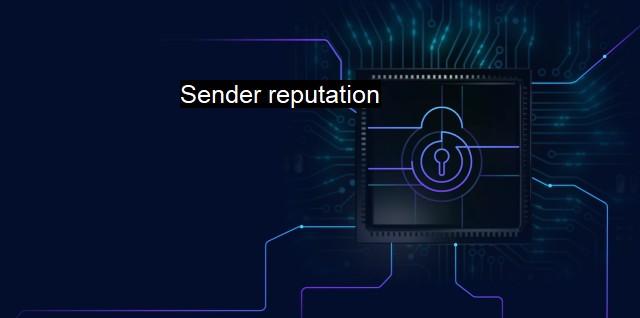What is Sender reputation?
Understanding Sender Reputation: An Essential Aspect of Cybersecurity in the Digital Age
Sender reputation refers to the degree of legitimacy attributed to an email source by Internet and email service providers (ISPs and ESPs). The sender's reputation becomes a deciding factor as to whether the email will reach the recipient's inbox or get directed to the spam folder, with lower reputation scores increasing the potential for an email to be flagged as spam.Sender reputation is determined by email service providers with the help of a variety of metrics, including the quality of email content, quality of contacts, email list health, authentication setup, subscriber activities and actions, and complaint rates among others. These factors work collectively to form sender reputation metrics, which govern email deliverability.
Email reputation, as the name suggests, is analogous to a personal credit score in the financial world that brands hold in the world of email security and privacy. Deliverability is the main effect of sender reputation; with a positive reputation, one's emails go directly to the inbox of the recipient.
Sender reputation in the context of cybersecurity extends beyond issues of email authenticity and deliverability. High spam scores not only risk condemning emails to the junk folder but, if dismissed and left unchecked, could also result in a damaged reputation and, worst-case scenario, blacklisting by ISPs or corporate email systems.
Therefore, thoroughly monitoring and continuously improving the sender's reputation is critical to maintaining a healthy email performance in terms of both marketing and general business correspondence. Any degradation in the sender's reputation can adversely impact the communication reach, ultimately affecting the impact and globalization of business relations.
In light of increasing cyber threats, including phishing, ransomware, and spoofing, sender reputation serves as an integral component of antivirus and anti-spam software. By scrutinizing historical data and behavioral patterns associated with an email sender, these security protocols intend to prevent malicious or harmful content from reaching the end-users' primary inboxes.
In terms of antivirus measures, the sender reputation serves as the first gatekeeper. Based on the sender's reputation, antivirus software decides whether to let the email in, block it, or mark it as suspicious. In specific, advanced antivirus software as part of their machine learning capability, keep updating the reputation score of a sender based on the quality and effects of their emails.
That said, knowing the importance of sender reputation urges organizations to avoid spammy tactics, maintain good email hygiene, ensure content quality and keep track of feedback loops. For instance, organizations should monitor bounce rates, email open rates and keep an eye out for blacklists to not impact their sender reputation negatively.
The sender reputation in the digital ecosystem of today is immensely influential, especially in the realm of cybersecurity and antivirus measures. It determines email deliverability and guards against cyber threats, ensuring legitimate emails secure their deserved position in an end-user's inbox optimally without undue damage to the sender's overall online reputation.

Sender reputation FAQs
What is sender reputation in the context of cybersecurity?
Sender reputation refers to the evaluation of the trustworthiness of an email sender based on their past sending behavior. In cybersecurity, email sender reputation is an important factor in determining whether an email is legitimate or malicious.Why is sender reputation important in antivirus software?
Sender reputation is important in antivirus software because it helps to identify and block emails that are likely to be malicious. By evaluating a sender's reputation, antivirus software can determine whether an email is likely to be spam, phishing, or contain malware.What factors contribute to a sender's reputation?
A sender's reputation is based on a variety of factors, including their sending history, the content of their emails, the frequency and volume of their sending, and the percentage of their emails that are marked as spam or reported as malicious.Can a sender's reputation be improved?
Yes, a sender's reputation can be improved by taking steps to improve their sending practices. This can include sending only relevant and valuable content, reducing email frequency and volume, and monitoring feedback from recipients to ensure that emails are not being marked as spam.| | A | | | B | | | C | | | D | | | E | | | F | | | G | | | H | | | I | | | J | | | K | | | L | | | M | |
| | N | | | O | | | P | | | Q | | | R | | | S | | | T | | | U | | | V | | | W | | | X | | | Y | | | Z | |
| | 1 | | | 2 | | | 3 | | | 4 | | | 7 | | | 8 | | |||||||